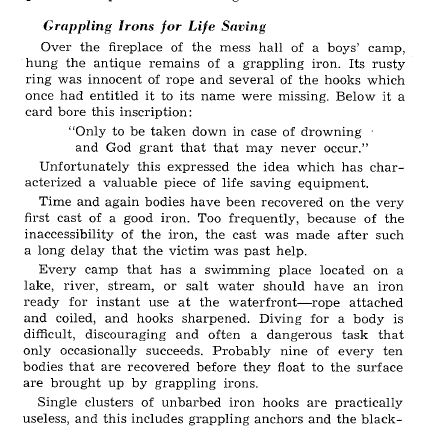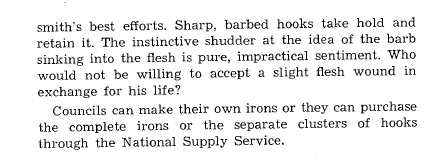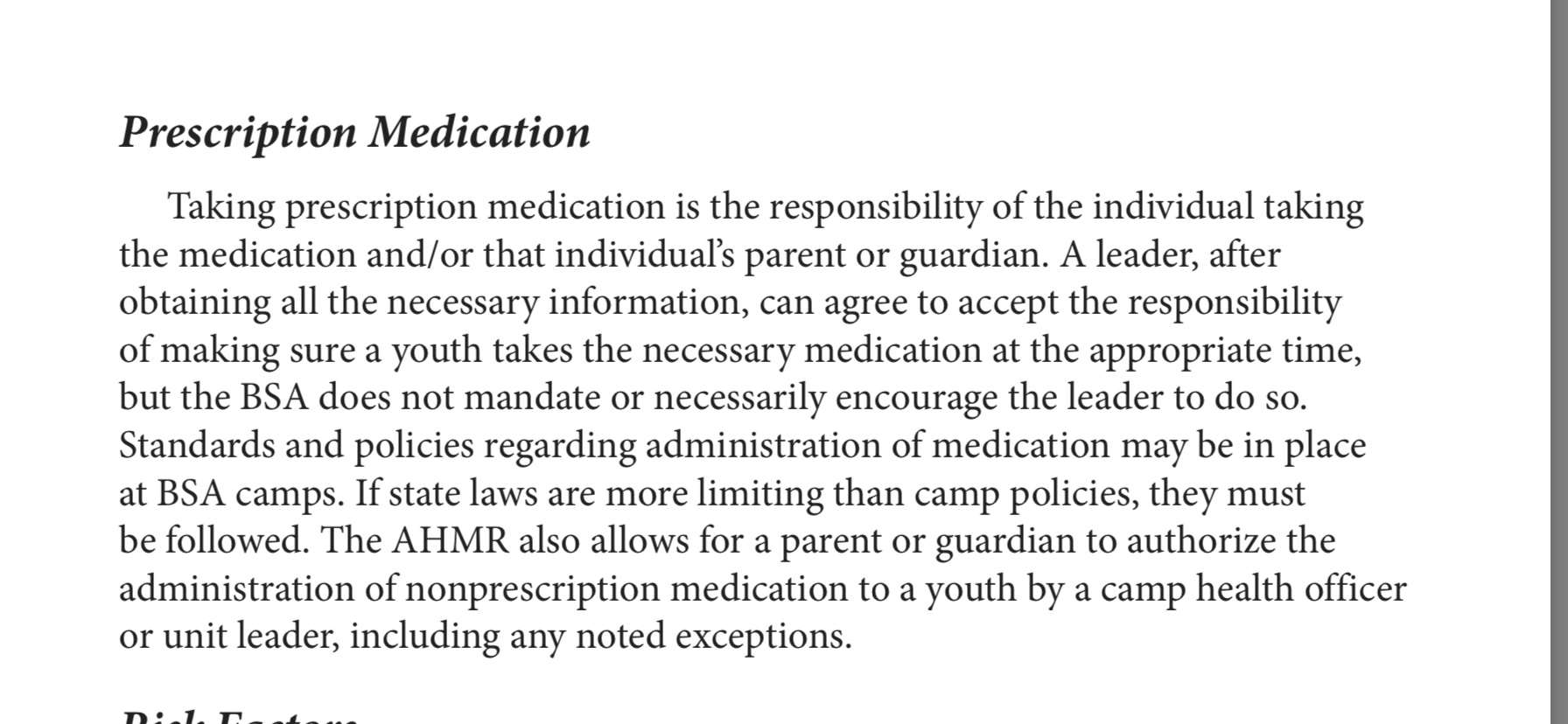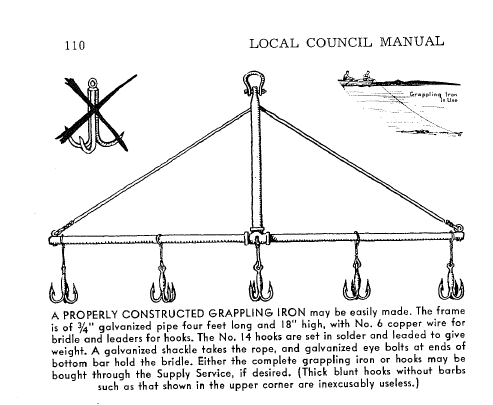-
Content Count
434 -
Joined
-
Last visited
-
Days Won
9
Content Type
Profiles
Forums
Articles
Store
Posts posted by RichardB
-
-
3 minutes ago, ParkMan said:
I didn't know that council volunteers bought them too.
https://www.scoutshop.org/nsearch/?q=professional feel free to order some.......
-
We have Field - Class A, Activity - Class B, Necker only, and I have one more....(very old photo links - scoutstuff.org only has the the pieces)


-
 1
1
-
-
So what is it called to just wear the neckerchief?
-
Which uniform do I have to wear while traveling for insurance?
-
 3
3
-
-
6 minutes ago, Cburkhardt said:
I would like examples of an annual health/consent form. This is obviously about making sure the parent/guardian has notice and has given specific consent for activities and events a Scout engages in. There would be precise ways to do this in a document. Some might list every pre-planned date and activity for the year. Others might reference categories of activities. In any case, please post some links to documents or web sites.
https://blog.scoutingmagazine.org/2014/04/10/ask-the-expert-the-who-when-and-why-of-scout-permission-slips/ gives background. No plans to change.
-
Actually, agree with the don't try this. If you do this as part of the BSA as some have mentioned you would be leaving kids without Two Deep Leadership, a core part of Scouting's Barriers to Abuse.
-
 1
1
-
-
Just got to love folks on Social media, the FB post figured it out after a while, but not before those in the fray sent emails to at least a couple of folk and posted to other social media expanding the call for what could be interpreted as let's make it hard. Who exactly is "they" @scoutldr
Side bar to the OP: Question - do you really want a "rule" for everything? What if the rule isn't the answer you seek? Oh, and I'm all for making this simple - how would you change up this https://www.scouting.org/health-and-safety/ahmr/ for better for clarity: "Applies to ALL participants"
Could we apply common sense, the Scout Oath and Law and what is reasonable to the hypothetical question poised? These are just hypothetical examples, every situation is going to be different and trusted adults need to help the candidate make good choices. Grandma comes to a Blue and Gold to watch Tammy get her Arrow of Light, reasonably not participating. Timmy's Dad running the chain saw in the TX cool front today at 98 degrees, it's in Scouting's and Timmy's Dad's best interest that folks have an AHMR on location and an adult leader looking over it before starting the work.
Background
@NealOnWheels here is a direct link to the planning guidelines. https://filestore.scouting.org/filestore/healthsafety/pdf/680-027.pdf
The first FAQ's of the AHMR outlines why Scouting has an AHMR. Excerpt with the Safety guy's emphasis added.
Q. Why does the BSA require all participants to have an Annual Health and Medical Record?
A. The AMHR serves many purposes. Completing a health history promotes health awareness, collects necessary data, and provides medical professionals critical information needed to treat a patient in the event of an illness or injury. It also provides emergency contact information.Poor health and/or lack of awareness of risk factors have led to disabling injuries, illnesses, and even fatalities. Because we care about our participants’ health and safety, the Boy Scouts of America has produced and required use of standardized annual health and medical information since at least the 1930s...
-
Here is the narrative @JoeBob it is probably one of my favorite stories. Remember this was 1940. The rusty one was probably from the 20's.


-
If I understand the back and forth of differing opinion.....
In broad terms, 51 weeks of the year the statement on the AHMR covers administration of OTC's that a troop might have in their FA kit or that Scoutmaster Bessie has in hers. Tylenol, Benadryl, would be common. Unless normally taken they would not necessarily be listed by a participants on their medication matrix. In the distant past, that would have been a solution to list them all Terasec. It still could be for you or your youth. Would say it would be okay to say list 200 mg of ibruprofen as needed for pain.
The week in camp, you have a council health supervisor who has authority over how a camp manages this, following local, state, or other requirements.
And let's not forget, at the end of the day, the management of the medical condition is between a youth and their parent.
As Eagle1993 mentions, most would check okay and leave the field blank unless there was an known reaction. Resource: https://filestore.scouting.org/filestore/HealthSafety/pdf/SAFE_USE_OF_MEDICATION_IN_SCOUTING.pdf
To the OP. Something to review. https://www.scouting.org/health-and-safety/incident-report/incident-reviews/allergies-and-anaphylaxis/
And some guideance: https://filestore.scouting.org/filestore/HealthSafety/pdf/2013Guidelines_Managing_Food_Allergies.pdf
-
 1
1
-
-
John, Standards go back into the 1920's - Post WWI, units were advised to do week long camp during the summer. It didn't always go well. Standards where introduced shortly after. Source is the letters / pre-Scouting Magazine. I am pretty sure they are electronically archived, it has been a few years since I reviewed.
@mrkstvns 2013 was when the NCAP program was rolled out and while I haven't found the direct link or source as above, it's my best guess that the origins of ACA's (and a couple of other) original standards came from those early ones of the BSA. I've got some neat old newsletters from the mid thirties with some standards from the era.
-
 1
1
-
 3
3
-
-
- Popular Post
- Popular Post
You should probably ask the older scouts Mom as she obviously has set the rule.
-
 6
6
-
 2
2
-
5 minutes ago, T2Eagle said:
This is why National has to keep adding rules to the GTSS. Coming soon, a rule against homemade boats on scout outings --- why, not because it's inherently unsafe or a fun idea to do as J76 does, but because somewhere out there is another group like this
I'm replying only because I want to be able to find this in a couple of months.
RichardB
PS: Really glad this worked out for everyone. Between flooding and a huge snow pack water around the US is high, cold and fast this year. Please plan with vigilance and take a PAUSE before you hit the water. https://filestore.scouting.org/filestore/healthsafety/pdf/680-046.pdf
-
Transportation and trees have recently been topics of discussion here and affected the Scouting family.
Before your next trip or outing, take a few minutes and review these with your peers and youth leadership.
Hazard Trees: https://www.scouting.org/health-and-safety/safety-moments/hazard-trees/
Transportation Safety Shorts: https://www.scouting.org/health-and-safety/safety-moments/transportation-safety-shorts/
RichardB
-
 2
2
-
 2
2
-
-
The joint task force was all military not civilian. No one on that TF was my boss. Sorry for your confusion.
-
I'm pretty sure that a protection detail was not an issue in 1998, but before my time and no photos have been provided to date. I should note it was particularly impressive to watch the joint task force have the honor of taking care of him as Secretary of Defense at the 2010 Jamboree. Was a great group of folks that were on that task force and everyone of them honored that he was in attendance.
To the topic at hand. The exception to firearms applies to LE officers who are required to carry within their jurisdiction, hunting in Venturing, and as part of a BSA shooting sports program. Here is a link to what those are: https://www.scouting.org/outdoor-programs/shooting-sports/
Please don't put yourself, your membership or others at risk with prohibited activities.
-
13 hours ago, Eagle94-A1 said:
As my Latin 3 teacher told us, 'Practice, practice, practice."
I wonder what BSA would say about the camp out that had 36 armed adults with automatic firearms, specifically MP5s. Absolutely nothing, except laugh.
Send me the photo and names and I'll take care of it.
-
Safety Moment on the Subject: https://www.scouting.org/health-and-safety/safety-moments/trailer-theft/
And a Scoutcast from this month: https://podcast.scouting.org/scoutcast/2019/june-2019-security/
-
12 hours ago, Scoutmomonly said:
The camp has never collected the meds. We have never been asked to bring a prescription or to turn them in. We note the meds on the health forms and kids are responsible for taking their meds. Now, I’m not saying I agree with that 100%, but that what it has been for the now five years we have been attending this camp.
I’m more concerned that the scoutmaster felt it acceptable to go through totes without scouts present. I don’t feel this models trustworthiness at all. He disagrees and basically said, “turn me in to council”. So, before I do, I was wondering the policy for searching a scouts belongings.
Sorry, this is summer camp
@Scoutmomonly Not here to comment on the process used, but perhaps you should review the leaders guide for the camp or if you are onsite visit with the Camp Health Officer about the background on the medication policies. The GTSS and the policies and guidance associated with the Annual Health and Medical Record and medication use are consistent. They point out that in some cases an authority having jurisdiction over the camp may have prescriptive guidelines, rules, policies or procedures regarding medications. In "most" cases, youth cannot store their own medications like they might the other 51 weeks of the year. 3rd sentence below as an example. Standards and laws change or the compliance with them may have as well. Sounds like the topic would make a great committee meeting post camp.

-
Please reach out to your council / the camp and report the incident. Dependent upon the unit and / or council some accident insurance assistance may be available to the parents.
Incident reporting page: https://www.scouting.org/health-and-safety/incident-report/
RichardB
-
 1
1
-
-
@Thunderbird and @Onslow Not sure what is confusing. Back country camping on one chart and age appropriate activity chart on the other. BOTH are current in the GTSS.
What is to catch up?
-
Just watch the speech, and don't let the CBS news take on it cloud your judgement. He is a class act.
-
https://www.scouting.org/health-and-safety/incident-report/incident-reviews/lightning/
Might be worth reviewing, in case you are bias because it hasn't happened to you directly. Like @oldscout448's ASM.
-
Do parents today (your future leader pool) have the ability to teach these skills? Asking for a friend.
-
Encourage you to read your latest edition of Scoutingwire. You should have received yesterday.
https://scoutingwire.org/ is where you can read the articles and Chief's corner. You can also sign up for it if for some reason you did not receive it directly.
-
 3
3
-




"There is no Class A" isn't a helpful statement most of the time, and people should stop posting it.
in Uniforms
Posted
@ParkMan The striped ties may be in process of going away or being replaced. Only the ladies shows in stock online. There is also a fleur-de-lis tie availble in red.